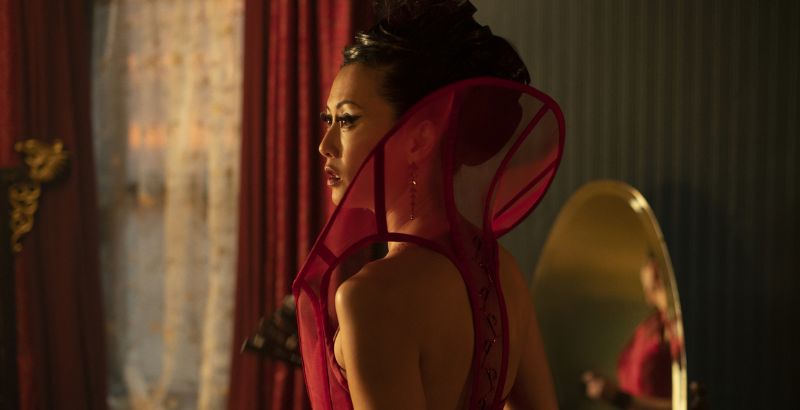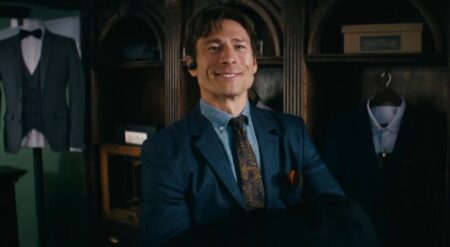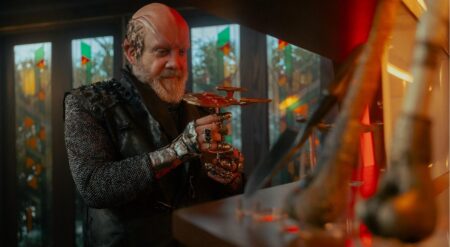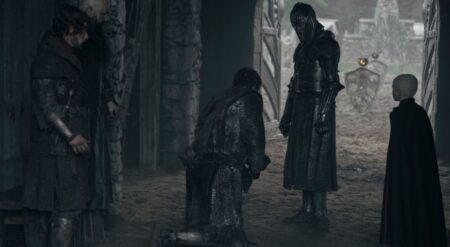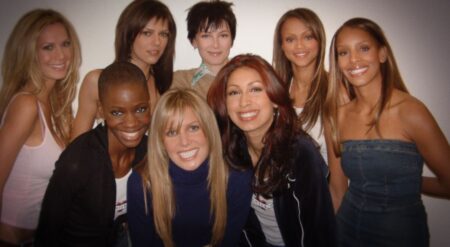Warrior is one of the best series on television and one of the best takes on the Western genre in recent memory, and that doesn’t change with Season 3. Originally on Cinemax for its first two seasons, Warrior aired its third season as a MAX Original. One of the few shows saved in the tumultuous streaming landscape, this unique series centers on San Francisco’s Chinatown in the late 19th century.
A martial arts Western based on the writings of Bruce Lee, it follows Ah Sahm (Andrew Koji), a man who came to the United States to find his sister Mai Ling (Dianne Doan). Only, the reunion came across gang lines as he rose within the ranks of the Hop Wei Tong and Mai Ling found herself as the head of its rival, the Long Zii. But Ah Sahm and Mai Ling aren’t the only characters that have dynamic storylines.
Warrior Season 3 takes place in the wake of the race riots that upended Chinatown in season two, which Mai Ling uses to her advantage. While Mai Ling has risen to great power as leader of the Long Zii and found love along the way with Li Yong (Joe Taslim), Ah Sahm and Young Jun, as well as the rest of the Hop Wei are wounded. With increasing police violence in Chinatown, the Tongs have to navigate the danger posed by the increasingly racist rhetoric on Walter Buckley’s (Langley Kirkwood) campaign trail, foreshadowing the future that is the Chinese Exclusion Act.
For Mai Ling, she’s able to use her government connections to consolidate power, while Ah Sahm and the Hop Wei must find new ways to survive which puts them even further under the microscope when they take printing their own money, looking to create authentic bills to get the upper hand.
At the same time, Ah Toy (Olivia Cheng) is pulled back to Chinatown after Strickland (Adam Rayner) decimates her quiet life with Nellie Davenport (Miranda Raison), forcing her and her girls back into Chinatown and the only profession open to them. Additionally, Richard Lee (Tom Weston-Jones) and Wang Chao (Hoon Lee) are forced through a traumatic situation connected to Lee’s past and hope to survive it.

Each character in Warrior Season 3 is expertly explored, but in that exploration, they each go through great pain. In fact, this season is easily the most painful to watch as a fan of these characters. No one escapes this season “okay” and the amount of pain they go through is heightened by the way their relationships intersect. Relationships in Warrior Season 3 are connected by raw nerves, exposed and causing pain throughout the season. But the shining character elements in the season are easily showcased Ah Toy, Mai Ling, and Young Jun (Jason Tobin).
For Ah Toy, we see her happy and in love, until Episode 3 of the season. She’s not just trying to survive in the world, but she’s thriving in it, helping the girls she saved from working in the brothels of Chinatown. In their vineyard, Ah Toy and Nellie are untouched until Strickland decides he wants to run his railroad through it.
When he raises their home to the ground, Ah Toy is broken for the first time in Warrior Season 3. She’s beaten badly as she returns to Chinatown, her body broken and her mind frayed by the loss she’s experienced. She isn’t allowed love, and in Chinatown, you’re not allowed to thrive. Throughout the season, we see Ah Toy break down even more. Instead of a loud cry, it’s a silent scream as she becomes hollow with each loss and each element of trauma thrust upon her.
As Ah Toy, Olivia Cheng is powerful and heartbreaking. Cheng is able to portray a woman trying to hold it together, putting her make-up on like armor, maneuvering through the world with belief and power to back it up that she will survive. But when she lets the mask slip, her vulnerabilities hurt to see. Ah Toy is allowed by the showrunners to feel her pain and feel it deeply, but because of the way that she is continually traumatized, you can see where the character loses bits of herself, hollowing out from the pain until an emptiness is left.
For Mai Ling, we see the choices that she’s made come into focus as she reaps the benefits and the consequences of her choice to work with the Ducks, the white, rich leaders in San Francisco. She plays to their Orientalism, presenting them with a story that makes her escape from China all the more ripe for the white savior picking by white women looking for a “cause.” She changes the Long Zi’s house to become a vision of what the Ducks believe China to be, and in playing this prop, she hopes to gain acceptance in their world. Only she doesn’t.
Mai Ling feels betrayed by the Ducks in San Francisco when she’s jailed for the transgressions of a white man. But when she grows increasingly paranoid about the men in the Long Zi looking to depose a woman as a leader, she also must weather betrayal by her own people too. There are moments in Warrior Season 3 where Mai Ling and Dianne Doan’s performance as her is unshakable and powerful.

But then, there are moments of vulnerability and fear that allow the audience to see the way that she is forced into action in order to protect herself, but also how it feeds into a paranoia that leaves her alone after forcing her now-husband to kill his best friend Kong Pak (Mark Dacascos). Much of Mai Ling’s storyline in Warrior Season 3 is watching the choices she’s made come to fruition, for better and for worse. But in her final moments of the season, she’s alone, she’s beaten, and she’s struggling to hang on to life.
While the women of Warrior are the strongest this season, in terms of driving the narrative, they also suffer some of the season’s most traumatic and egregious moments. This isn’t inherently a bad choice, but it is one that makes me question why their identities have to be constantly under attack by their own people and the racist power structures at the same time.
And not just ephemerally but physically. If one thing is true this season, it’s that no character gets a happy ending. A dynamic one, yes, but not a happy one. Yet somehow, seeing Mai Ling and Ah Toy stripped of agency and traumatized again and again sticks out.
But if the women of Warrior is one highlight of the show’s third season, watching Young Jun struggle to fill his father’s place as leader of the Hop Wei and the uncertainty he must handle when Father Jun (Perry Yung) returns is the other. While Ah Sahm has been the focus for the past two seasons, the triumph of the extended cast in Warrior Season 3 is ensuring that the stakes are raised within their ranks too. This is due in part to the relationships of the series but also because of the chemistry of the cast and how they move around and clash with each other.
This is perfectly captured in Young Jun (Jason Tobin), who has carried the fear of letting his father down across every season. He’s grown from a petulant child to a leader, and none of that is more clear than in his personal and emotional conversations with his father as he moves in and out of lucidity, dementia kicking in. Young Jun is caring and loving.
He’s soft and kind as his father begins to forget who he is and where he is. Young Jun has to watch the man that he has idolized deteriorate, and with that, he has to make a choice. Does he keep his father alive selfishly, to keep his guidance or at least the specter of it? Or, does Young Jun grant his father peace? Does he give him agency and accept that death is going home?
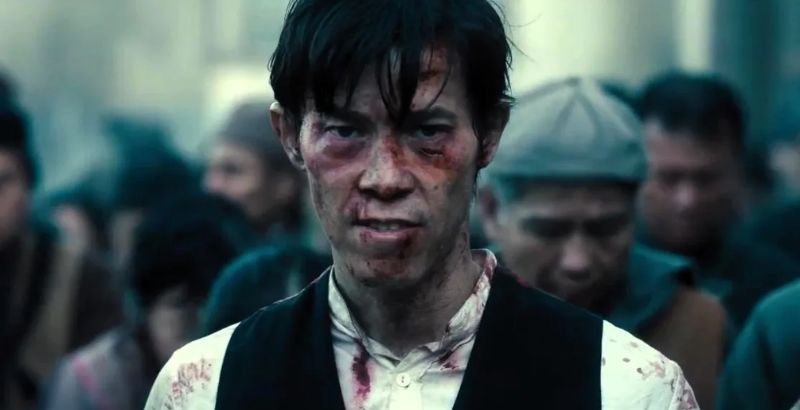
The process of this decision is pivotal to closing Young Jun’s character arc, and in a way, it’s the most complete any character feels in Warrior up until this point. Tobin’s portrayal of grief as a son who still, for all of his talk and whiskey and sticky, just needs his father. It’s a moving portrayal of family that extends as we see him and Hong (Teng Chan) get closer to one another. Young Jun isn’t alone. He has his brothers in the Hop Wei, but most importantly in Hong and Ah Sahm, until he doesn’t.
Warrior Season 3 is a triumph and highlights the power of using action to tell a story. With committed actors who show a depth of emotion and skill, the story in Season 3 completes journeys begun in Season 1 and reacts to every choice made in this season specifically.
While I’ve praised the emotional performances from Cheng, Doan, and Tobin, Warrior Season 3 doesn’t sacrifice rousing action sequences that embrace Bruce’s legacy on film. In fact, the fights this season are bigger, better, and more well-lit than the previous two outings. The series has always excelled at action choreography and plotting, but it reaches a new level in Season 3.
If Warrior Season 3 has one flaw, it’s that phenomenal acting by the white cast, primarily that of Kieran Bew as Bill and Dean Jagger as Dylan Leary causes immediate conflict with where I want to put my attention as a viewer. Chinatown is the heart of Warrior, it has been since Season 1.
While it has to be investigated to see the intricate political and prejudiced framework that Chinatown is subject to, the choice this season to spend quite a bit of time on the plight of the Irish after watching racist diatribes by them or sympathy for a former Confederate soldier, doesn’t sit entirely well. But that uncomfortableness is also pushed by Jagger’s stellar performance.
The series tries to make Leary endearing. He’s a man pushed by his Irish identity as white but still not American to fight for his people, but his constant racism leaves all of that teetering between context and apologetics for the pain that he and others like him have put our core cast of Asian characters through equally. While Bew’s performance as Bill is undeniable, his struggles in being pushed out of the police force aren’t always the ones that should take precedence.
But what do we do with characters that are awful, but entirely well-acted? We have to praise them, even if there are moments I wish more care and time was put into core stories in Chinatown instead of those in the Pond. This is even more true when Ah Sahm, our series’ initial protagonist, feels moved to the side this season.
Warrior continues to set a standard for Westerns and action on television. Capturing revenge with consequence and action with emotion is what makes the series gold, and this season in particular, intimately grand. Warrior is a series that deserves to continue long past Season 3.
Still, it’s made the most of its 10-episode run to present a story that never lost sight of its character amid action sequences and fantastic reimaginings of some of Lee’s iconic marital arts moments. With so much drama and flare, Warrior’s ability to keep the narrative connected throughout its seasons is a fantastic feat.
Warrior Season 3 is available now on MAX (formerly HBO Max) and Netflix.
Warrior Season 3
-
Rating - 9/109/10
TL;DR
Warrior continues to set a standard for Westerns and action on television. Capturing revenge with consequence and action with emotion is what makes the series gold, and this season in particular, intimately grand.

